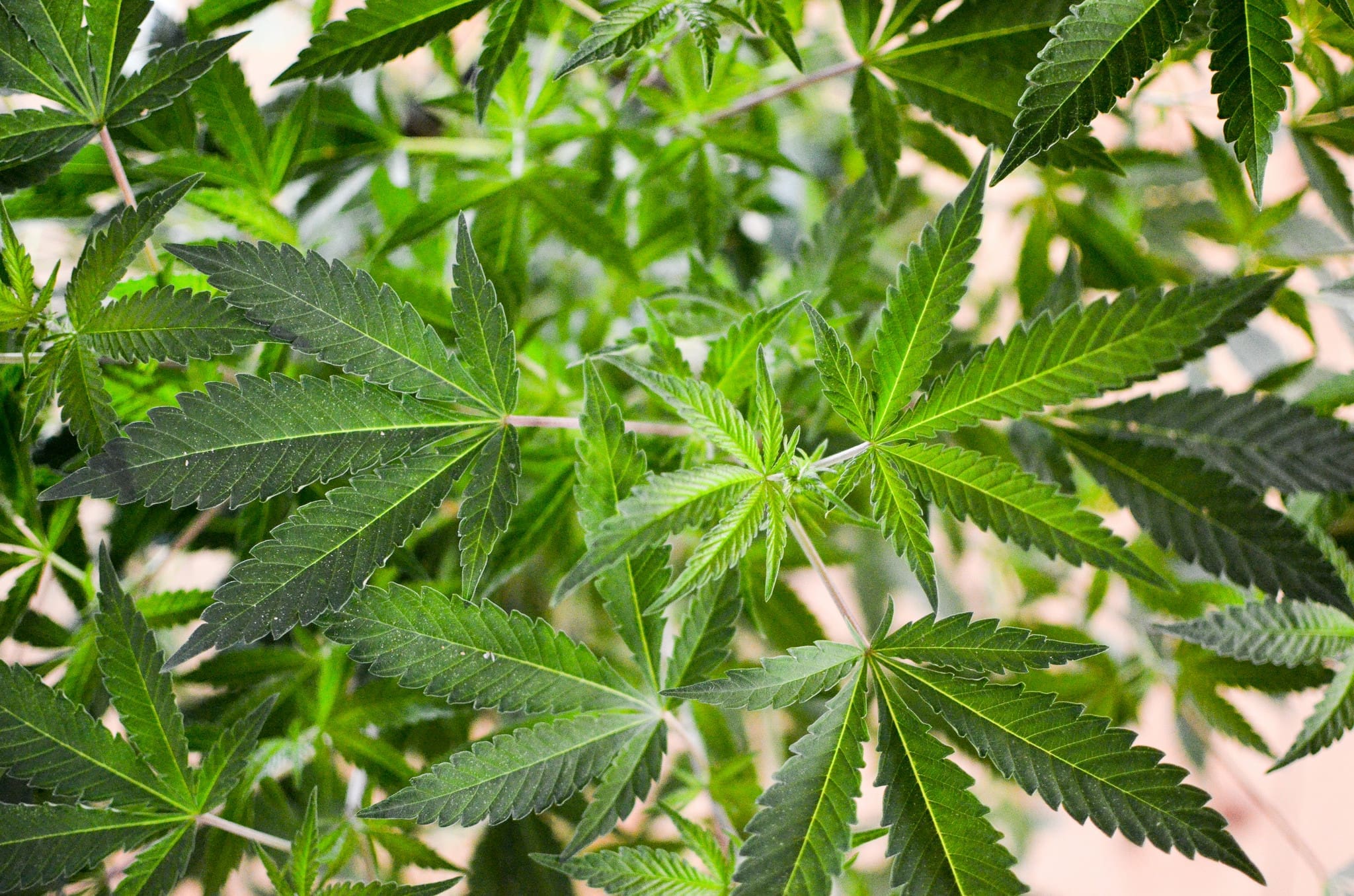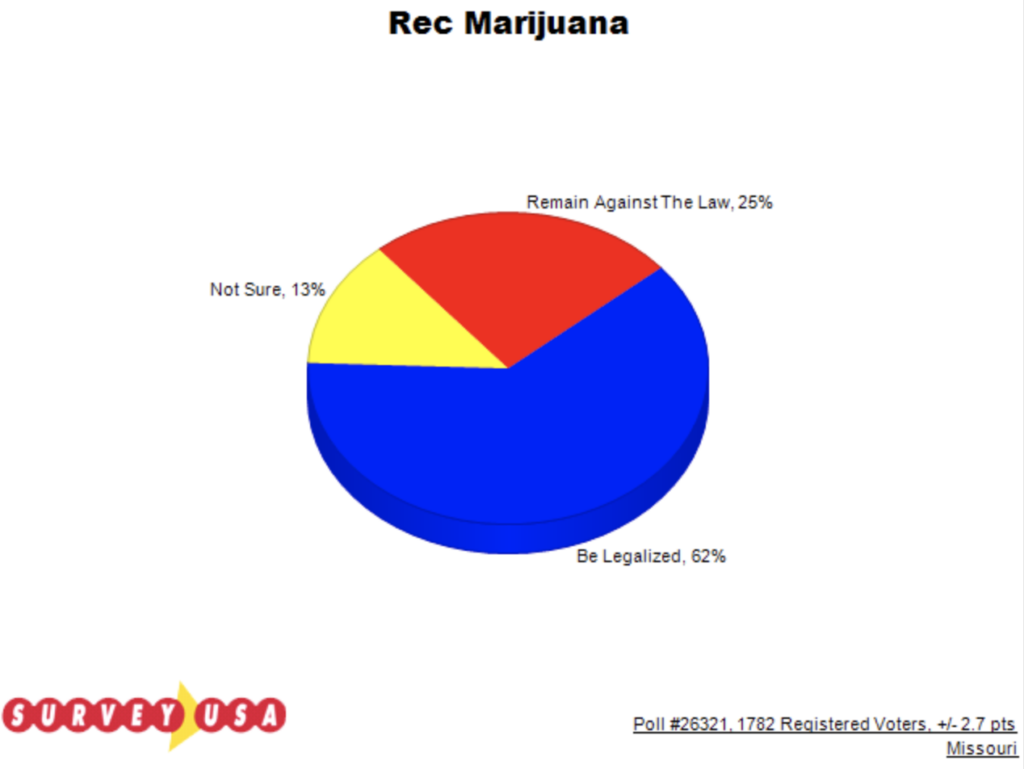Politics
More Than 6 In 10 Missouri Adults Support Legalizing Cannabis As Initiative Heads Toward Ballot, New Poll Says

With cannabis legalization on track to be on Missouri’s November ballot, a newly released poll indicates strong support in the state. Of those surveyed, 62 percent said they support legalizing marijuana, while 25 percent said the drug should remain illegal. Another 13 percent said they weren’t sure.
Support for legalization was strong across party lines. Though majorities of Democrats and independents have long favored the policy change more than Republicans, the new poll also that more GOP voters support legalization (49 percent) than oppose it (38 percent).
The survey comes on the heels of activists at Legal Missouri 2022 earlier this month turning in what they said are more the double the required number of signatures needed to qualify a legalization initiative. Provided the signatures are validated by elections officials, the measure would go before voters in November.

Via SurveyUSA.
The new SurveyUSA poll, conducted on behalf of TV stations across the state between May 11 and May 15, asked 2,175 Missouri adults questions about various policy issues, including law enforcement and public schools.
Across nearly every demographic group—including race, gender, age and party identification—more respondents favored legalization than opposed it.
On aggregate, a greater proportion of men (66 percent) than women (58 percent) said they support legalizing marijuana. Younger respondents, such as those in the 18-34 and 35-49 age groups (both of had 71 percent support) were also more likely to favor the policy change than older groups in the 50-64 (59 percent) or 65+ (46 percent) age groups.
Black and white respondents showed near-equal levels of support for legalization, at 62 percent, but white people also were more likely than Black respondents to say cannabis should remain illegal (27 percent and 14 percent, respectively). Among people who said they belong to another racial group, 57 percent favored legalization, 19 percent opposed it, and 24 percent—more than any other group—said they weren’t sure.
Strong majorities of Democrats (76 percent) and independents (66 percent) also said marijuana should be legal. By contrast, only 49 percent of Republicans said they support legalization—but that’s still more than the 38 percent of Republicans who oppose it. And 13 percent of GOP respondents remain undecided.
The only groups that had more people opposing legalization than in favor were those who identified as “very conservative” or who said abortion should always be illegal.
The campaign manager for the adult-use legalization push, John Payne, previously led the successful 2018 ballot effort in Missouri to legalize medical cannabis. If Legal Missouri 2022’s proposal becomes law, it would allow all adults 21 and over to possess and consume cannabis.
Here’s what Legal Missouri 2022’s reform initiative would accomplish:
Adults 21 and older could purchase and possess up to three ounces of cannabis.
They could also grow up to six flowering marijuana plants, six immature plants and six clones if they obtain a registration card.
The initiative would impose a six percent tax on recreational cannabis sales and use revenue to facilitate automatic expungements for people with certain non-violent marijuana offenses on their records.
Remaining revenue would go toward veterans’ healthcare, substance misuse treatment and the state’s public defender system.
The Department of Health and Senior Services would be responsible for regulating the program and issuing licenses for cannabis businesses.
Regulators would be required to issue at least 144 microbusiness licenses through a lottery system, with priority given to low-income applicants and people who have been disproportionately impacted by drug criminalization.
Existing medical marijuana dispensaries would also be first in line to start serving adult consumers with dual licenses.
Regulators could create rules around advertising, but they could not be any more stringent than existing restrictions on alcohol marketing.
Public consumption, driving under the influence of cannabis and underage marijuana use would be explicitly prohibited.
A seed-to-sale tracking system would be established for the marijuana market.
Local jurisdictions would be able to opt out of permitting cannabis microbusinesses or retailers from operating in their area if voters approve the ban at the ballot.
The measure would further codify employment protections for medical cannabis patients.
Medical marijuana cards would be valid for three years at a time, instead of one. And caregivers would be able to serve double the number of patients.
Legal Missouri 2022’s initiative is backed by the Missouri Medical Cannabis Trade Association as well as ACLU of Missouri; St. Louis City, St. Louis County and St. Charles County chapters of the NAACP; NORML chapters in the state and Missouri Association of Criminal Defense Lawyers. However, certain advocates and stakeholders have pushed back against the campaign.
Some advocates and stakeholders have raised concerns about the largely industry-funded proposal and pushed for legislative reform instead, like a legalization bill from Rep. Ron Hicks (R). That measure moved through the committee process, but failed to advance to a floor vote before the session adjourned on May 13.
Critics of the proposed initiative say its lack of language specifically prohibiting a licensing cap on businesses means that any market that emerges will be neither open nor competitive. Some have also raised concerns about the measure’s provisions to give medical cannabis dispensaries a head start in serving the adult-use market.
While Legal Missouri 2022’s measure appears to be headed for the ballot, those advocates aren’t the only ones who’ve called for legalization be decided by voters. Rep. Shamed Dogan (R) also introduced a GOP-led joint resolution this session that sought to put the matter on the state ballot. That measure cleared a House committee as well but did not see floor action.
A different campaign, Fair Access Missouri, separately explored multiple citizen initiatives this year with the hopes of getting at least one on the ballot.
Also this year, Republican Rep. Jason Chipman (R) filed a joint resolution this session that would let voters require additional oversight over how medical cannabis tax revenue is distributed to veterans. And another state lawmaker filed a bill late in February to decriminalize a range of drugs including marijuana, psilocybin, LSD, MDMA and cocaine.
In March, a Missouri House committee held a hearing on a GOP-led bill to legalize a wide range of psychedelics for therapeutic use at designated care facilities while further decriminalizing low-level possession in general.
Nearly 1 in 10 jobs that created in Missouri last year came from the state’s medical marijuana industry, according to an analysis of state labor data that was released by a trade group last month.
Photo courtesy of Philip Steffan
















